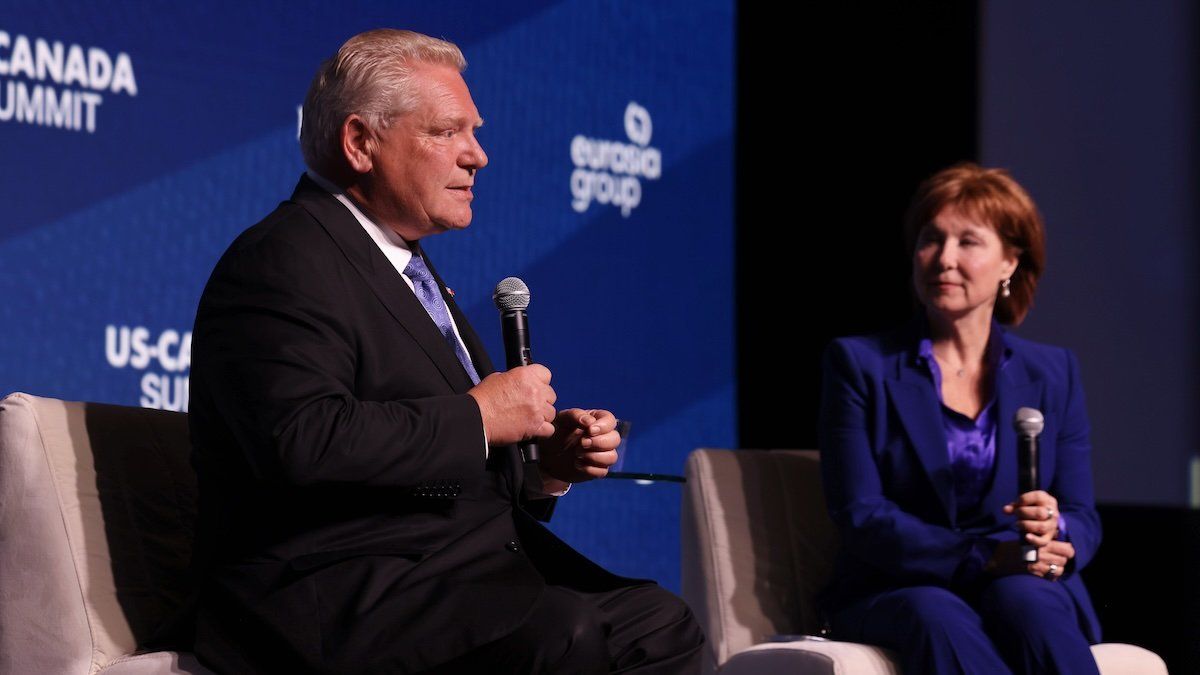Bye-bye globalization, hello regional blocs. That was the big takeaway from speakers at the US-Canada Summit in Toronto this week hosted by Eurasia Group (our parent company) and BMO. Their message: The best of neighbors need to be the best of friends, on everything from energy, to critical minerals, to food, to defense – and to do otherwise is to court disaster.
When asked by former British Columbia Premier Christy Clark, “What keeps you awake at night?” Ontario Premier Doug Ford was blunt. “American protectionism. If you look around the world right now, we’re so much stronger when we're united. We’re up against China, all of Asia, Europe, South America.”
Ford went on to tout Canada’s ability to provide critical minerals to power EVs, advocating for the creation of a critical minerals supply chain between the two countries similar to the North American Auto Pact.
The elephant in the room was the possibility of a Trump administration and whether it would take a more protectionist tack.
Supporters of Donald Trump and Joe Biden differ somewhat in their perceptions of Canada.
A Eurasia Group poll on the US-Canada relationship asked folks on both sides of the border whether they think of their neighbor as a partner, competitor, or adversary, and 67% of Americans see Canada as a partner, 10% as a competitor, and 3% as an enemy. A whopping 82% of Biden voters see Canada as a partner, compared to 61% of Trump voters.
North of the 49th parallel, 66% of Canadians see the US as a partner (17% Competitor, 2% Enemy) with no differences across partisan lines.
But what shape should such a partnership take?
When asked whether they would support an EU-like arrangement between the two nations, 50% in Canada and 55% in the US liked the idea while 33% were neutral and 14% opposed it. Biden supporters (71%) are far more supportive than Trump supporters (45%), while support in Canada is balanced between both sides of the partisan split (50% for the Liberals and NDP, 54% for Conservatives).
Christopher Liddell, former White House Deputy Chief of Staff for Policy Coordination and author of “Year Zero: The Five-Year Presidency,” says both Republicans and Democrats have become more protectionist. “We’re at the beginning of a 20-year trend that both parties have bought into – reshoring, industrial policy, rebuilding the middle class, rebuilding jobs.”
Politicians are simply listening to their voters. In the words of Randy Quarles, former vice chair of the Federal Reserve, “If you’re a 55-year-old furniture maker in Hickory, North Carolina, globalization is never going to be better for you. It may be better for your kids, but never for you.” Convincing that furniture maker to friendshore with Canada will only succeed if there’s something in it for them.
And that something is security, a commodity fast disappearing in a more and more uncertain world. In this respect, Canada can play a major role, starting with energy security.
In the view of Saskatchewan Premier Scott Moe, “If we get our energy security, we’ll have our food security, we’ll have our national security. But it starts with energy security.” Alaska Gov. Mike Dunleavy agreed, adding that as the world reorders itself from a globalist to regionalist perspective, the two nations can both prosper.
In Ford’s words, “With Putin showing no sign of ending his illegal war in Ukraine, while China continues to assert itself in the global economy at a time when things are uncertain, it has never been more important to bet big on the Canada-US relationship.”
We’ll be watching to see how this unfolds in this election year.
